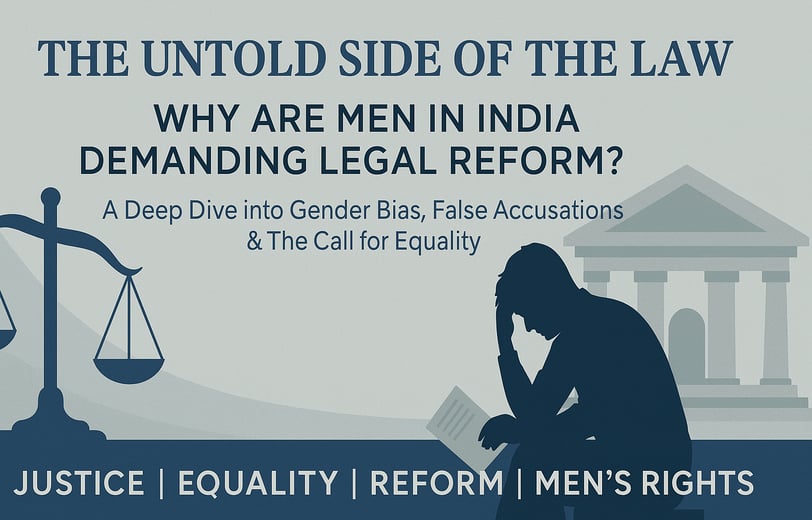The Untold Side of the Law: Why Are Men in India Demanding Legal Reform?
Avinash Jaiswal
4/14/20254 min read


Introduction: The Silent Outcry of Indian Men
In a country where gender justice has long been synonymous with women's rights, a parallel narrative remains mostly unheard — the legal and societal challenges faced by Indian men. For decades, the Indian legal system has introduced laws designed to protect women from patriarchal injustices, and rightly so. But somewhere along this path, the concept of gender neutrality has been sidelined.
More and more Indian men are now voicing concerns over laws that are misused, or that entirely exclude male victims. This is not a plea to diminish women’s rights, but a call for fairness — for laws that protect all citizens equally, irrespective of gender.
This article delves deep into this lesser-discussed issue: Why are Indian men demanding legal reform, and what are the key concerns driving this movement?
The Legal Bias: Gender-Specific Laws That Impact Men
Indian laws, particularly those related to domestic violence, harassment, and family matters, are often structured around the assumption that men are the aggressors and women the victims. While this has helped combat historical gender-based violence, it has also led to a legal environment prone to misuse.
Examples of Gender-Specific Legal Bias:
Section 498A IPC – Targets husbands and in-laws for cruelty against women.
POSH Act, 2013 – Protects only women from workplace sexual harassment.
Dowry Prohibition Act – Presumes male guilt without due process.
Domestic Violence Act – Provides no remedies for male victims.
Section 498A IPC/Sec 85 of BNS – A Double-Edged Sword
Originally introduced to curb cruelty and dowry harassment, Section 498A has become a lightning rod in the debate on men’s rights.
Key Issues With 498A (Sec 85 of BNS):
Presumption of guilt without trial.
Automatic arrests without investigation.
No penal action for false complaints.
Long-drawn legal battles even for the innocent.
According to the Supreme Court in Rajesh Sharma v. State of U.P. (2017), "misuse of 498A has risen to alarming proportions." This led to the court issuing guidelines to limit arrests and encourage preliminary inquiries. However, despite such interventions, legal safeguards remain weak.
The Mental Health Toll on Men
False accusations and legal harassment don't just result in court appearances—they shatter lives. Accused men often face public humiliation, job loss, broken families, and social isolation. The mental toll is devastating.
Alarming Statistics:
Over 90,000 married men die by suicide every year in India (NCRB data).
Lack of mental health support systems for men.
No legal acknowledgment of psychological abuse against men.
In most cases, even male victims of emotional or financial abuse have no legal recourse, as laws are written to protect only women.
Child Custody and Family Courts: The Father’s Fight
Family courts in India tend to operate on the assumption that mothers are natural caregivers, often sidelining the father’s role.
Key Challenges for Fathers:
Custody almost always awarded to mothers.
Visitation rights are minimal or inconsistent.
Parental alienation is not legally recognized.
Financial burden of child support without emotional access.
Men’s rights advocates argue for joint custody laws and reforms that treat both parents equally, emphasizing the child’s right to both parents.
Sexual Harassment Laws: Where Are the Male Victims?
The POSH Act, 2013, aimed at preventing workplace harassment, is gender-specific — it only addresses female victims. However, men and transgender individuals can also be targets of harassment.
Limitations of the POSH Act:
Excludes male and LGBTQ+ victims.
No internal complaints mechanism for men.
HR policies often don’t recognize male grievances.
In a rapidly evolving corporate culture, gender-neutral harassment laws are not just progressive—they're essential for inclusive workplaces.
The Call for Gender-Neutral Laws
There is a growing consensus among legal scholars, social activists, and men’s rights groups that India needs gender-neutral laws. These laws should be based on the act, not the gender of the accused or the victim.
Reforms Men Are Demanding:
Make Section 354 (outraging modesty), Section 375 (rape), and Section 509 (sexual harassment) gender-neutral.
Establish a National Men’s Commission, just like the National Commission for Women.
Include male victims in domestic violence laws.
Create support centers and shelters for abused men.
Recognize and penalize parental alienation.
Introduce legal provisions against false allegations with strict punishment.
These reforms would not dilute protections for women but ensure that no one is left unprotected simply due to their gender.
The Role of Men’s Rights Organizations
In recent years, a number of men’s rights organizations have emerged across India. While they operate with limited media attention and government support, they play a crucial role in supporting victims and advocating for change.
Key Organizations:
Save Indian Family Foundation (SIFF): Runs helplines, legal counseling, and awareness campaigns.
Men Welfare Trust: Provides free legal aid to men facing false accusations.
Indian Family Foundation: Focuses on reforming family laws and promoting shared parenting.
These organizations work tirelessly to ensure that men’s issues find representation in public policy.
Judicial Opinions: Winds of Change?
Though the legislative response has been slow, the judiciary has shown signs of acknowledging gender bias in the law.
Recent Developments:
In multiple judgments, courts have warned against the misuse of 498A.
Courts have acquitted men falsely accused of rape, noting the need for stricter scrutiny.
In Joseph Shine v. Union of India, the Supreme Court struck down the adultery law, calling it discriminatory against men.
Some High Courts have recommended gender-neutral laws, especially in sexual harassment and education policies.
These judicial remarks, though not binding for legislative reform, signal a shift in mindset toward balanced justice.
International Perspectives: Global Trends in Gender-Neutral Laws
Many countries have already embraced gender-neutral legal frameworks, offering valuable models for India:
United Kingdom: Domestic violence laws apply equally to men and women.
Canada: Legal recognition of male sexual assault victims.
Australia: Shared parenting is encouraged by law.
Sweden and Norway: Leading examples of gender-equal legal systems.
India can learn from these models and adapt reforms to suit its socio-legal context, while maintaining the rights of women and protecting vulnerable individuals of all genders.
Why This Matters for India’s Future
Ignoring the legal struggles of Indian men can have far-reaching societal consequences:
Undermining trust in the justice system.
Excessive litigation due to false accusations.
Mental health crises among falsely accused individuals.
Broken families and alienated children.
For India to evolve into a truly inclusive democracy, it must adopt laws that serve everyone equally. Justice cannot afford to be one-sided.
Conclusion: Towards an Inclusive Legal Reform
The growing demand for legal reform by Indian men is not a threat to women's rights—it is an appeal for equal protection under the law. Men, like women, deserve to live in a society where justice is blind to gender, where victimhood is not judged by stereotypes, and where laws uplift, rather than punish, the innocent.
Gender-neutral legal reforms are not just necessary—they are overdue.
As India strides toward a more progressive and fair society, the time has come to acknowledge male vulnerabilities, amend outdated legal provisions, and build a truly equitable justice system for all.
Contacts Us
+91 7068780290
vidyaplanetorg@gmail.com


